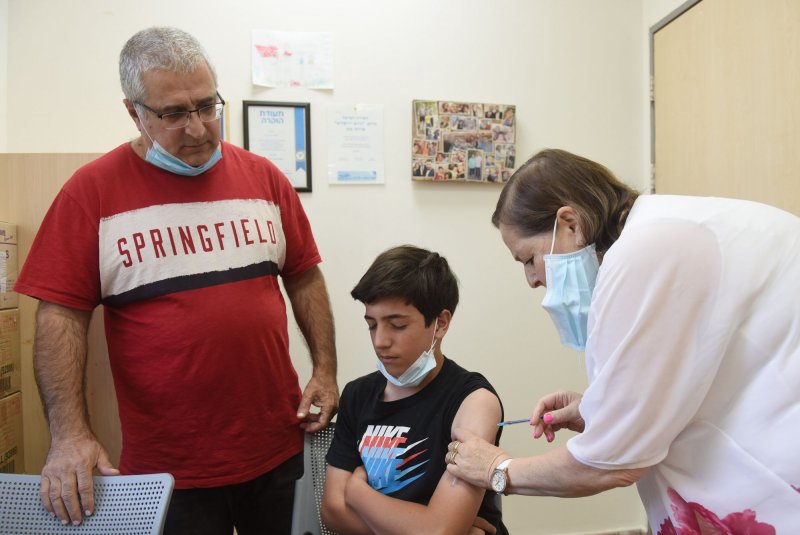1 of 5 | For teens who develop myocarditis after vaccination against COVID-19, researchers say symptoms show up in about six days and patients are "mildly affected." File Photo by Debbie Hill/UPI |
License Photo
Aug. 10 (UPI) -- Teens who develop myocarditis after receiving the Pfizer-BioNTech COVID-19 typically do so within six days of their second dose, and most are "mildly affected" by it, according to an analysis published Tuesday by JAMA Cardiology.
The condition, which is rare, is characterized by inflammation of the heart muscle that affects its ability to pump blood to the body.
In the small study of 15 teens age 12 to 18, all experienced chest pain within six days of COVID-19 vaccination, while two-thirds had a fever and more than half had muscle pain, the data showed.
All 15 patients in the study were hospitalized due to the heart complication, but all were discharged after an average of two days without the need for intensive care, and only one had lingering symptoms.
"Myocarditis is a rare complication that develops following COVID-19 vaccination in children [and though] the acute course was relatively benign ... the long term cardiac effects remain unknown," study co-author Dr. Audrey Dionne told UPI in an email.
However, "myocarditis is also a risk with COVID-19 infection [and its] course can be more severe acutely," said Dionne a cardiologist at Boston Children's Hospital.
For this reason, "the benefits of vaccination outweigh the risks," even in teens, she said.
The Food and Drug Administration issued an emergency use authorization for the Pfizer-BioNTech COVID-19 vaccine for use in teens ages 12 to 15 years in May.
The Moderna vaccine, which has a similar composition, has not yet received an EUA or approval for children in this age group, though studies are ongoing.
Through mid-July, nearly 9 million teens in the age group had received at least one dose of the two-shot vaccine. Of those, just over 4% of the 9,246 teens with reactions to the vaccine developed myocarditis, according to data released Friday by the Centers for Disease Control and Prevention.
Still, fewer than 1% of teens age 12 to 17 required medical care in the week after receiving either vaccine dose, the agency said.
Meanwhile, about one-third of young people who develop severe COVID-19 will experience multi-system inflammatory syndrome, or MIS-C, a disorder in which multiple organs, including the heart, show signs of inflammation, a study published in July by the journal Pediatrics found.
Children with coronavirus-related MIS-C may take several months to recover, the data from the Pediatrics study showed.
At least initially, children were thought to be at low risk for severe COVID-19 earlier in the pandemic.
However, nearly 94,000 new child infections were reported last week, with many cases requiring hospitalization, according to a report released Monday by the American Academy of Pediatrics and the Children's Hospital Association.
For the JAMA Cardiology study, Dionne and her colleagues followed 15 patients age 12 to 18 who were hospitalized for myocarditis following receipt of the Pfizer-BioNTech vaccine.
Fourteen of the patients were male, and myocarditis diagnosis was confirmed by magnetic resonance imaging in 13 of the study participants.
Eleven of the patients had fully recovered from their myocarditis within two weeks of hospital discharge, according to the researchers.
Overall, researchers wrote in the study that "in short-term follow-up, patients were mildly affected."
Data on the risk for myocarditis in young people following vaccination "is currently still very limited," Dionne said.
As a result, whether the benefits of vaccination outweigh the risks "may need to be reassessed as we learn more about this complication," she said.















